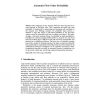504 search results - page 12 / 101 » Observational Logic |
ICTAI
2005
IEEE
14 years 3 months ago
2005
IEEE
Partially Observable Markov Decision Processes (POMDPs) provide a general framework for AI planning, but they lack the structure for representing real world planning problems in a...
SEMWEB
2009
Springer
14 years 4 months ago
2009
Springer
Most languages for the Semantic Web have their logical basis in some fragment of first-order logic. Thus, integrating first-order logic with probability is fundamental for represen...
JOLLI
2008
13 years 10 months ago
2008
While monadic second-order logic (MSO) has played a prominent role in model theoretic syntax, modal logics have been used in this context since its inception. When comparing propos...
SAS
2004
Springer
14 years 3 months ago
2004
Springer
Role logic is a notation for describing properties of relational structures in shape analysis, databases and knowledge bases. A natural fragment of role logic corresponds to two-va...
CORR
2004
Springer
13 years 9 months ago
2004
Springer
We have previously introduced role logic as a notation for describing properties of relational structures in shape analysis, databases and knowledge bases. A natural fragment of ro...

